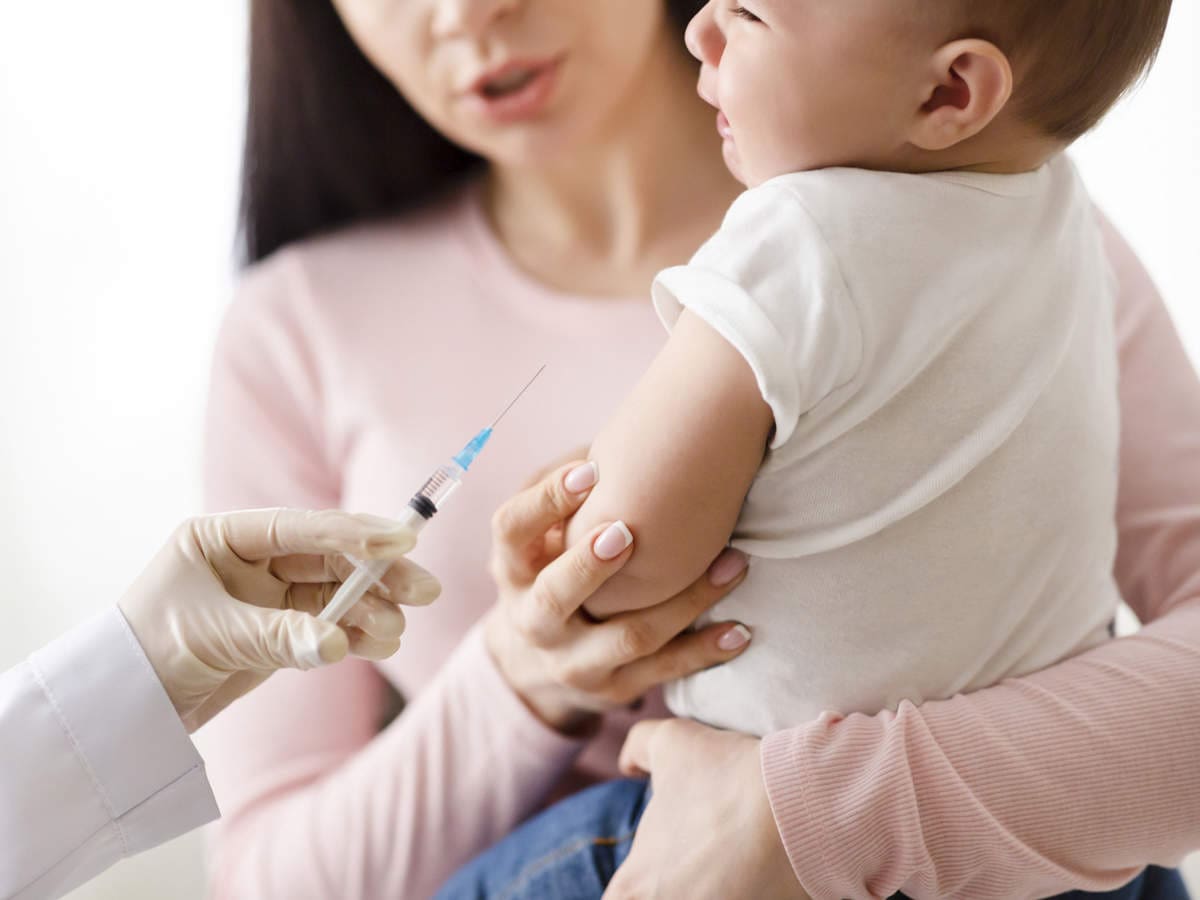

Why Are We Vaccinating Babies?
The U.K. has approved Covid vaccines for babies. The medical watchdog saying the “lower-dose Pfizer jab is safe and effective for kids aged 6 months and above”, with the new approval covering infants age 6 months to 4 years.
The medicines regulator said the jab meets safety, quality and effectiveness standards. This means that Government vaccine advisers can now choose whether the jab should be dished out to babies.
There are already Government advertising campaigns targeting young people, as per the NHS: “The coronavirus (COVID-19) vaccines are safe and effective. They give you the best protection against COVID-19.”
Governments continue with the ‘safe and effective’ mantra. The U.S. Centers for Disease Control and Prevention (CDC) said on its websites and elsewhere that the Covid genetic injection was ‘safe and effective’.
And in promoting the CDC’s recommendation for young children, the White House Coronavirus Response Coordinator, Ashish Jha, stated that the vaccination for children aged 6 months to 5 years was “exceedingly safe and effective and thoroughly tested”.
Whilst the European Medicines Agency states that “the authorised COVID-19 vaccines are safe and effective. They were evaluated in tens of thousands of participants in clinical trials and have met EMA’s scientific standards for safety, efficacy and quality”.
Despite these assurances, there remain widespread concerns amongst the public regarding the safety, effectiveness and need to vaccinate very young children. The latest Government data on vaccine uptake show only 7% of children aged between five to 11 in England having had two doses of a Covid vaccine.
So what is the evidence of safety and effectiveness of the Covid vaccine for young and very young children, and what is the evidence of the need for vaccinating children at all?
It is notable that in the latest material there is no mention of vaccinating children so that they do not transmit to others and kill them, which I assume is because it is now widely accepted that the vaccines do not prevent transmission, so the only reason therefore to inject children is to protect the children themselves.
What is the Covid risk to children without vaccination?
Recently published analysis by Professor John Ioannidis shows persons 0-19 have a 0.0003% risk of death. For children 0-10 years of age the risk of severe outcome and death from Covid is basically zero.
In the U.S., analysis of the FDA’s data shows the risk of any child dying of COVID-19 is 0.000015 % and a study by the universities of Leeds and Leicester found that there had been no deaths of healthy children in the U.S.
In Canada, the Canadian Health Alliance states: “Without a serious pre-existing medical condition, the risk of death is statistically zero.”
And no healthy child has died of Covid in Scotland, Northern Ireland, Canada, USA, Iceland or Ireland.
In the U.K., according to Professor Norman Fenton, a world leading expert on risk assessment and statistics with Queen Mary University of London: “No healthy children died in the U.K. in 2020”; of the eight children who died, seven had life threatening conditions and one had a very serious condition.
That about sums up the risk to children: the evidence shows that children are not at risk.
So I ask again – ‘effective’ against what? There appears to be no threat to children, so what are the vaccines protecting them against?
And are they actually effective? Data from the CDC show case rates among children who got two shots were higher than rates in children who did not get the shots.
A CDC study also found that the effectiveness of two doses of Pfizer’s COVID-19 shots against symptomatic COVID-19 infection “was modest and decreased rapidly” from December 2021 to February 2022.
The study found that two to four weeks after the second dose of Pfizer’s COVID-19 shots, effectiveness was 60.1% among 5 to 11 year-olds. This fell to just 28.9% by the second month.
Research by Swiss Policy Research indicates that vaccine protection against symptomatic infection decreased from about 90-95% shortly after vaccination to close to 0% within about half a year.
The fact that current Covid vaccines provide only short-term, rapidly waning protection against infection and transmission means that Covid vaccines contribute very little to infection control, either at the individual level nor at the population level.
Thus, while the risk-benefit ratio may still be positive in senior citizens and other risk groups (based on current evidence), this does not appear to be the case in healthy young adults and children.
Obviously the risks from the vaccine should be set against the risk of a child dying from Covid, which as the data show is practically zero. The data also show it is not even effective in doing what it is claiming to do.
What about the safety?
As noted above, in promoting the CDC’s recommendation in the USA, the White House Coronavirus Response Coordinator, Ashish Jha, stated that the vaccination for children aged 6 months to 5 years was “exceedingly safe and effective and thoroughly tested”.
In responding, Dr. Jeffrey Barke, the Chief Medical Officer for the Convention of States, stated, “This is simply not true,” and that to recommend this product (the vaccine) for six-month-old children “makes absolutely no sense whatsoever.”
“Healthy children do not die from this illness, so it doesn’t make sense to authorise it under emergency authorisation for kids under 18, let alone 6 months,” he added.
He said that these are products for which “there have been no long-term safety studies”.
According to data released in September, more than 55% of children ranging in age between 6 months and 2 years had a ‘systemic reaction’ after their first dose of the Pfizer or Moderna COVID-19 vaccines.
Indeed, there were more than 1,000 reports of adverse events after COVID-19 vaccination in children aged 5 and younger, according to CDC data.
And again, according to the CDC, one in 4,500 toddlers have been taken to the hospital emergency room after Covid vaccination, and around 10% experienced serious side-effects. The U.S. Government vaccine adverse events reporting system (VAERS) reports 220 out of the approximately one million babies and toddlers vaccinated were taken to the emergency room right after vaccination.
According to a study published in JAMA, nearly one in every 500 children under five years who received the Pfizer mRNA Covid vaccine were hospitalised with a vaccine injury, and one in 200 had symptoms ongoing for weeks or months afterwards.
According to VAERS there have been 54,697 adverse event reports received for children from 6 months to 17 years through August 26th 2022, including 149 deaths, 507 permanently disabled and 1,902 cases of myocarditis.
Dr. Peter McCullough, a leading U.S. cardiologist, said about children suddenly dying: “It’s through the roof.” “Before Covid vaccines there were four cases of myocarditis per million… The current estimates are now… 25,000 per million.”
Meanwhile Denmark has banned Covid vaccines for anyone under 18 unless prescribed by a doctor based on an individual assessment of high risk.
Parents should be provided with this information relating to adverse effects and risk ratio. The law sets out what they are entitled to, namely informed consent. The NHS website explains:
What does consent mean?
It means agreement. Before a doctor, nurse or any other health professional can examine or treat you, they must have your consent.
You must be given enough information, and you should be allowed to make up your own mind without pressure from other people.
What information should I be given?
To help you make a decision, NHS staff involved in your care must give you information about the examination or treatment you are being offered in a way that you understand. E.g. what the benefits are whether there are any risks or side effects; how large or small the risks are; whether there are any alternatives.
Is this being done? Are parents being offered the information they require to make an informed decision?
The international medical and data expert organisation PANDA sums it up as follows:
These products should have been contra-indicated for the vast majority of the population for whom the overall net benefit-risk ratio is either zero, or limited and short-lived, with efficacy versus the risk of infection becoming negative after six months and an unknown longer-term safety profile.
There was insufficient justification for the emergency rollout of these products to the general population. This represents a massive failure of regulatory oversight and changes are needed to ensure this cannot happen again.
What we have, however, is uninformed consent, as seen in the tragic story of a 14 year-old vaccine myocarditis victim.
The evidence presented suggests that Covid vaccines are not effective, there are serious questions about their safety, and they are not necessary for children.
The weight of independent evidence here should be enough to cause the powers that be to pause and reflect. There is tremendous public anxiety regarding this push and elected officials should take cognisance of it.
As the Christian theologian Dietrich Bonhoeffer said: “The test of the morality of a society is what it does for its children.”
Hugh McCarthy is a retired Headteacher in Northern Ireland who until recently served as a Director on two of the province’s main education councils and who remains a ministerial appointment on one.







